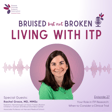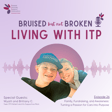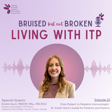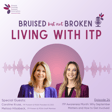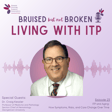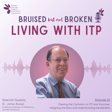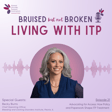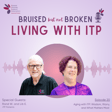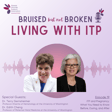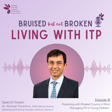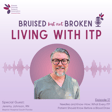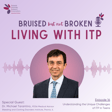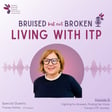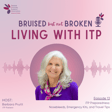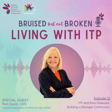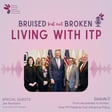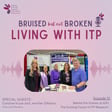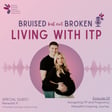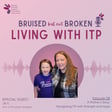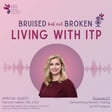Life Before and After ITP Diagnosis
00:00:00
Speaker
So I don't really remember living without ITP. I couldn't do any swimming lessons. It was really hard to see everybody else being able to live a normal life while I had to be kind of bubble wrapped at the beginning.
00:00:14
Speaker
But once I started to get on medication, everything started to become a little bit more normal. So even though i had the ITP, I wasn't going to let it stop me from living my life.
00:00:28
Speaker
I was probably about the same age that Josh is now when I was diagnosed. I had graduated high school, got a spot on my college volleyball team, went through the year practicing, going to classes, and it wasn't until my spring semester that I woke up before all my final exams just kind of covered in bruises.
00:00:53
Speaker
And I had convinced myself it was a bruise rash, that that was something that could happen to you because there was no other explanation for it.
00:01:04
Speaker
And so I kind of ignored it. And then it wasn't until I came home for the summer that my mom mentioned i was really tired and kind of complaining about it.
00:01:16
Speaker
And then she saw the bruises. And that was kind of the the eye-opening moment of, oh, you know, we should probably go get this checked out.
Podcast Focus: Bruised But Not Broken
00:01:34
Speaker
Welcome to the PDSA podcast, Bruised But Not Broken, Living with ITP. The diagnosis of a bleeding disorder like immune thrombocytopenia may leave you wondering, how can I really live my life with itp The PDSA's podcast, Bruised But Not Broken, Living with ITP, brings empowering stories, the latest research and treatment updates, lifestyle tips, and answers to the real-life questions the ITP community is asking.
00:02:02
Speaker
Here's your host for this episode, Barbara Pruitt.
00:02:13
Speaker
Oh, hello, hello, and I'm glad you could join us today. This is Bruised But Not Broken, Living with ITP, and we're here for another episode.
Teenage Experiences with ITP
00:02:22
Speaker
to- Today I've got Peter with me, my husband.
00:02:25
Speaker
Great to be here. Looking forward to hearing another great episode. You've done quite a few now. Twice a month. You know, the 15th and the 30th, they're released. So we keep coming up with topics.
00:02:39
Speaker
So what's today's topic? Well, today's topic is about being a teenager with ITP. Well, I met you when you we you were a teenager.
00:02:49
Speaker
You were 16 and I was 17, right? That's right. And I had ITP. and When you say that, I don't remember when you actually told me you had ITP, but it had to have been pretty soon after that.
00:03:03
Speaker
After we met? After we met. Yeah. I remember as a teenager not wanting to be any different Then in the other teen, you always want to fit in I didn't go around telling everybody that I had ITP, but when I was bruised or somebody would ask me, oh wow, what'd you get that from?
00:03:25
Speaker
i would just tell them, you know, oh, I've got a blood disorder. bruise very easily and leave it at that. Just kind of brush it off. So I'm sure I told you along the way.
00:03:36
Speaker
i don't remember when either. It it just was a part of me. part of who I was. And you mentioned you have two guests. Yes, I have two guests. One who is a teenager and one who is an adult that had ITP as a teenager. So going to get both of their perspectives on what it was like and what it is like living with ITP and being a teenager and navigating through the waters. So I think it'll be a good topic.
00:04:09
Speaker
That sounds like a great episode, so take it away. All right.
00:04:18
Speaker
Today we are joined by two patients, Josh Kelly and Melissa Hilsebeck. Josh joins us from Ontario, Canada, and Melissa joins us from California.
00:04:31
Speaker
Welcome to both of you. Thank you for joining us. Glad you're here. Today's topic is actually itp teens. And I know both of you have experienced that.
00:04:44
Speaker
And this is really an important thing to discuss because when people are diagnosed and they are teenagers and they want to be active, there's a lot of questions regarding what they can do, what they can't do. So Josh, can you tell us a little bit about when you were diagnosed and and how that came about and how old you were?
00:05:08
Speaker
Yeah, so I was 10 when I was diagnosed, but we think I had symptoms for a year before that. I've got eczema, so my skin gets rashes every once in a while, so the doctors just thought that the petechiae was that. They told me to put more cream on. um Then when I was starting to really feel the fatigue, they told me i might be anemic and just said, eat more iron. We don't need to do a blood test. There's nothing wrong.
00:05:38
Speaker
Um, after a three hour nosebleed that happened a week after being told don't have a blood test, they finally caved in and got me a blood test. And after that, discovering that I had a needle phobia, um,
00:05:57
Speaker
I got diagnosed with ITP and started to be seen at the children's hospital in Toronto.
Josh's ITP Journey and Advocacy
00:06:05
Speaker
Okay. And how old were you then? i was 10. and 10 years old.
00:06:10
Speaker
Wow. That's young. Big deal for someone of your age ah ah as a 10 year old. How did it affect things when you were a child? How did it first affect you or what do you remember the most?
00:06:23
Speaker
So i don't really remember living without ITP. I know that I couldn't really participate in gym class or i couldn't continue playing baseball.
00:06:36
Speaker
I couldn't do any swimming lessons. It was really hard to see everybody else being able to live a normal life while I had to be kind of bubble wrapped at the beginning. But once I started to get on medication, everything started to become a little bit more normal.
00:06:55
Speaker
Couldn't go to sleepovers because of the fear of having a nosebleed. um Everybody thought I looked okay, but everybody who knew, knew I wasn't.
00:07:05
Speaker
Wow. Did you have a lot of bruises on your body? I mean, were there signs to other people that, oh, maybe this isn't right? Yeah. Most of my unexplained bruising and petechiae was under my clothes, so it wasn't really noticeable, especially as I got older.
00:07:24
Speaker
you could start to see the fatigue. And every once in a while, people ask me, oh you've got a rash going up your neck. And I just have to explain it's my petechiae from my blood disorder.
00:07:36
Speaker
Was that hard to do for you when people would approach you? Did you feel uncomfortable? Not really, especially because the life that I remember as a kid mostly is with ITP.
00:07:50
Speaker
I've had it for eight years now. So... pretty just under half my life I've had ITV, but I normally dumb down the explanation saying, yeah, I've got a blood disorder. My blood doesn't clot.
00:08:08
Speaker
Every once in a while I'll have like little pinprick bruising. That's what you're seeing on my neck or my arms. Yeah. And you want to make it simple, you know, for somebody to understand, you don't want to make it and get real scientific and make it difficult.
00:08:22
Speaker
Now, as you've grown into your teenage years, has your perspective changed on having your ITP? I mean, are you more aware of it?
00:08:33
Speaker
how How are things going now? So as a kid, I didn't really have much to do with it. My mom normally, she managed all the blood tests, the hospital visits.
00:08:48
Speaker
She did everything. Like when I was on My first medication, which was ah TPO pill with dietary restrictions. So I'd have to wake up at 4 a.m. m every day to take the pill to then have breakfast before I went off to school.
00:09:07
Speaker
So she would be setting an alarm to come and wake me up at 4 a.m. m every day. Sometimes I didn't even remember taking it. That's how I was just asleep when I took it half the time.
00:09:18
Speaker
And you got used to it. As I grew up, I've definitely became more involved with it. I started looking up what my symptoms were, what I should be looking out for.
00:09:30
Speaker
I became a lot more involved with it. I started sitting in the room when my mom was on care groups, the Zoom meetings that happen all the time.
00:09:41
Speaker
And especially as I've gotten more older, started going to PDSA conferences and Zoom meetings. I've become more of an advocate for myself. I started managing it more noticing everything you're growing up yeah you know this is what happens we have to take responsibility for our own health care and our own well-being it's i remember it was kind of a an unusual shift where my parents were in charge and then all of a sudden you know it was going to be my my job to be in charge and um
00:10:14
Speaker
Hey, it worked out.
Melissa's Treatment and Stabilization
00:10:15
Speaker
I'm still here. So Melissa, you were diagnosed as a teenager and, um, tell us about that experience. How old were you when you got the diagnosis?
00:10:27
Speaker
I was probably about the same age that Josh is now when I was diagnosed. I had graduated high school, got a spot on my college volleyball team, went through the year practicing, going to classes. And it wasn't until my spring semester that I woke up before all my final exams just kind of covered in bruises. And I had convinced myself it was a bruise rash.
00:10:56
Speaker
that that was something ah that could happen to you because there was no other explanation for it. And so I kind of ignored it. And then it wasn't until I came home for the summer that my mom mentioned and i was really tired and kind of complaining about it.
00:11:15
Speaker
And then she saw the bruises and that was kind of the the eye-opening moment of, a you know, we should probably go get this checked out. And so as a college freshman, super excited to sleep in for the summer, i get a call the next morning at 8 a.m. from my doctor.
00:11:34
Speaker
hey your platelets are really low. I need you to go to the emergency room right away. I already called them. They shouldn't be expecting you. You just need to get there now. And that was a pretty scary moment.
00:11:46
Speaker
And then I learned about what ITP is. And since my diagnosis, I didn't know anybody who had it. No family members knew about it.
00:11:57
Speaker
And there wasn't too much online back then. And so i went on ah steroids for quite a few months, tapering on and off, and that wasn't really working out. So our hematologist called me and my parents in and said, you know, we need to find another treatment option. So and we came in on a Monday or a Tuesday and she had printed out all the treatments and said, here, you know, do your homework. and let me know by Friday what you want to do. Because if you're going to get your spleen taken out, we need to get you your shots.
00:12:33
Speaker
And so it was it was an overwhelming doctor's visit because we were like, i don't I don't know anything about this. I thought that my physician was going to you know provide some guidance. And here I am not then not knowing what shared decision-making was, but looking back, that's kind of what it was. But it was just very overwhelming for us because it all these words we couldn't pronounce, there weren't any long-term scientific studies because most of the treatments were pretty new.
00:13:03
Speaker
And so um at the time, we said, well, otherwise I'm a young, healthy young adult. So we decided to opt for a splenectomy. But two weeks after, my platelets fell again. so they they didn't necessarily call it refractory at that time. They said, hey, you know, let's put you back on steroids for a while. Maybe your body just needs to adjust.
00:13:27
Speaker
And then a few months later, during my final exams again, i had quite a dip um in my platelets and petechiae all over my body. um So that was pretty stress-induced. I ended up getting a nosebleed when I never get nosebleeds.
00:13:43
Speaker
And then at that point, I also started a ah TPO. And um once I came off my steroids from that TPO treatment, my platelets have held at a steady level.
00:13:56
Speaker
So kind of looking back, I think that some of the hematologists talk about combination therapies. And because I had a splenectomy and then a few months later had another treatment, i I believe that that was enough to kind of reset my immune system.
00:14:13
Speaker
And my platelets have held stable since then, which is about 12 years now. Wow, that's wonderful. And it would be nice if we knew who that could happen with, because that's what everyone wants to achieve, you know, is stable platelet count and a healthy range.
00:14:30
Speaker
So- How did your family, this is for both of you, what was your family's involvement? How did they support you through all of this? And how did you feel? How did you cope with what was going on?
Family Support in Managing ITP
00:14:43
Speaker
Josh? When I first got diagnosed, my mom didn't really sleep very well for the first couple weeks. um She was up late at night, looking up everything and trying to become as much of an expert as possible.
00:14:57
Speaker
Especially as I've grown older, my family has become really supportive. They've always been supportive of it, especially with the fatigue that I'm experiencing now coming home from school and just having to go for an hour nap, at least almost every day. They keep quiet.
00:15:15
Speaker
They're always, they're understanding that I need the extra sleep. When I was younger, my brother at first, he wasn't really understanding like, Oh, he can't come play on the trampoline with me.
00:15:31
Speaker
he can't play with Nerf guns or anything. So, but as he's gotten older too, he's, he's learned a lot more about it and become a lot more understanding of, Oh, he might get bruising or he might start bleeding a lot.
00:15:50
Speaker
So I can't really play rough with him. Right. So he looks after you in some ways. There's, There's a learning curve for the whole family, you know, when something like this happens.
00:16:02
Speaker
And Melissa, what was your situation with your family and coping with this diagnosis? I think my parents were pretty pretty scared and they didn't necessarily let me see that side of them.
00:16:22
Speaker
And my two brothers also knew and I think that it was the first time that we really had a ah major medical condition in our immediate family. So everybody kind of sat back and, you know, well, let's see what happens.
00:16:43
Speaker
But my mom was very proactive. I think it wasn't until... after I had all of my treatments and I was seeing where my platelet count was that I even found out about PDSA.
00:16:57
Speaker
And once my mom found out, you know, she was calling the office and talking to all the staff members and just getting all of her questions answered. and And that's when we knew about the conference and PDSA said, we really want you to come. What can we do to get you here? And so I think from when I had my last treatment to the PDSA conference was about a month.
00:17:20
Speaker
So it was very quick turnaround of we found an organization that can support you. Let's book our tickets. Let's just get there and and go from there.
Impact of PDSA Conference
00:17:29
Speaker
And that was really life changing. So feeling very blessed. And I think from attending our first conference, that really changed how my family was able to support me because now they knew other families and other patients had something. And, you know, I met other local patients from California at that conference and we're still friends to this day and co-facilitate support group together. So that really opened a lot of doors and in terms of how my family was able to support me.
00:18:03
Speaker
That's wonderful. I know for myself, going to my first PDSA conference was life-changing because I had lived my whole life with ITP.
00:18:14
Speaker
and did not meet another person with ITP until I was 45 years old when I went to my first ITP, con you know, PDSA conference. So it's a very life-changing experience because when you're diagnosed with something like this and you can't find other people with it, you feel like you're alone and nobody understands what you're going through.
00:18:39
Speaker
And when you meet other people, you're like kindred spirits. And it just makes the burden a little easier, knowing that there's other people out there. Have both of you, I mean, you've met other teenagers at the conference. I know, Josh, you were at the conference in Texas this past year. Yeah. So that wasn't the first time that I met other people around my age. The first time I met people around my age was at the 2023 Canadian conference.
00:19:12
Speaker
And that was really my first time knowing that there's other people my age because the meetings that my mom was normally on was adults that had it.
00:19:24
Speaker
So I couldn't really understand that. Oh, there's it's not just adults that get it. I'm not the only kid. So that was eye opening experience to know that they know what I'm going through.
00:19:39
Speaker
And then especially when I went to Texas last summer, being able to meet people from all around the world, that was really fun because as soon as you meet them, there's no explaining that needs to be done. It's just an instant click.
00:19:54
Speaker
They know what you've gone through. You know what they're going through. It's just like an instant family. Like everybody with the PDSA is so supportive and as soon as you meet somebody, it's just like an instant bond.
00:20:12
Speaker
You have a lot in common that you didn't know. Yeah. And Melissa, your, your journey has brought you to the PDSA and you are the director of outreach and community engagement.
00:20:25
Speaker
So you're very knowledgeable about the organization. And could you tell us about the team track and what all goes on with their communication and everything? When I attended my first conference, um like Josh, I met others around my age and I actually ended up clicking with another woman who was my age at the time.
00:20:49
Speaker
And she and i became best friends. And a few years ago, I was actually the maid of honor in her wedding. And because we met at PDSA and we both have the same blood disorder.
00:21:01
Speaker
So that was really wonderful. And so and every year she's from Canada, I'm from California. So we use the PDSA conference as a way for us to see each other at least once a year.
00:21:12
Speaker
And so because we started doing that, we kind of started to come up with more ideas about how we can give back to PDSA and the ITP community. And we were actually a part of the inaugural teen track at the conference.
00:21:27
Speaker
And that was co-hosted by Dr. Michael Tarantino and PDSA. And he came in with his staff and we kind of took the teens that attended the conference and pulled them aside.
00:21:40
Speaker
Some sessions were with their parents, some sessions were just with the physicians and the teens so that they could have a place to learn how to share their story.
00:21:51
Speaker
and be comfortable opening up because like Josh mentioned, it's you don't really talk about it, but once you see somebody who's also going through the same thing that you are, you're a little bit more willing to share some of those uncomfortable things that you're feeling.
00:22:07
Speaker
And we've been running the teen track for for many years, over 10 years now, and it's been really great. We hear stories all the time about teens who meeting somebody for the first time at the PDSA conference, attending the teen track, and then going back to their hematologist appointment where previously they wouldn't really say anything. Maybe one of their parents would kind of take the lead.
00:22:33
Speaker
But after attending the conference in the teen track, now the teens are the one running the show, which is really great and and very heartwarming to hear about. So We're always evolving our teen track. Josh has kind of gotten involved to help us come up with some new ideas.
00:22:50
Speaker
And that kind of leads us into PDSA creating a year-long teen program. It's not something that we've launched just yet, but it's in the works and something we're very excited about.
00:23:02
Speaker
That sounds wonderful because as a teenager, you don't want to be different. You know, you want to fit into your group with your peers. And and it's really nice that you can form a group of peers with ITP and you've got your own community then, you know, that's terrific.
Sports and ITP: Perseverance and Limits
00:23:20
Speaker
And Josh, have, have your feelings towards your ITP or your ability to talk about it changed since you've been involved with the PDSA and the teen track?
00:23:32
Speaker
Yeah. I never like definitely when I was younger, i had my mom do most of the talking. She helped me, make a presentation to share to my classes about what was going on with me, why I couldn't do certain things.
00:23:49
Speaker
But and especially going into high school, I've started to be a lot more active with advocating for myself.
00:24:00
Speaker
And even at the the last teen track at Texas, I had a lot of parents come up to me and just say, thank you for being able to speak up about what you've gone through because i was able to share what I'd gone through, which then helped the parents know what's going on with their own children who might not know what to say.
00:24:27
Speaker
Well, none of us know what the future holds. And i think with hearing other ITP patients' stories, it helps you as an individual know that, okay, things can go in a lot of different directions. There's a lot of different choices for treatments, but you've got support. You know, when you know someone else with ITP,
00:24:49
Speaker
you've got support that way. And that's what's great about the organization, the PDSA, because that's a great community of of people. And everyone is very supportive, which is something that i I would hope that anyone dealing with ITP would find the organization because I i i know for myself,
00:25:12
Speaker
It was just life changing. And both of you have also said the same thing. So I can't thank you enough for being on today's podcast. You both are terrific. You're handling this really well. It looks like your futures are bright. and And I have to say, Josh, congratulations. he got He was notified this morning that he got into a college that he wants to go to, right?
00:25:35
Speaker
Yeah, my top pick. Your top pick. I'm off to the capital of Canada for your school. He's going to Ottawa. So that's terrific, Josh. Congratulations. so Thank you. know You're going to hit those milestones. you know Those are in your future. You're going to see a lot of milestones. So this is just one along the way. So congratulations, Melissa. Thank you.
00:25:58
Speaker
And I have a question for Josh. ah Since getting diagnosed as a child and growing up in sports through your teen years and now moving on to college, there are many other teens that are also playing sports. So can you talk a little bit about your your journey with sports and your coaches and your teachers and and any advice that you would have for other teens with ITP that are playing sports?
00:26:25
Speaker
Yeah. So when I was diagnosed with I was just playing house league baseball. Once I got diagnosed, it was pretty much a full stop on everything until I started treatments and my platelets started to level out.
00:26:40
Speaker
But once my platelets leveled out, I actually started to play elite travel baseball, traveling all over the province and across the States as well. So even though i had the ITP, I wasn't going to let it stop me from living my life. And I knew when to stop.
00:26:58
Speaker
if something was wrong. I did have a couple bad experiences with ah couple coaches who just didn't understand what I was going through. One coach, he um was really, he really put me down.
00:27:14
Speaker
Like, I got really sick one year and everything just came crashing down. All my medication, couldn't take it because of how sick I was. And so,
00:27:25
Speaker
I got super tired. My platelets were all out of whack and everything was just rock bottom kind of. So just trying to work my way up from there and having a coach being, why are you being so lazy?
00:27:39
Speaker
Put in more effort. You're not putting in enough. Even though we had talked to him about what was going on what had happened, he just didn't understand. It's too bad. Yeah. It got the whole team to put me down.
00:27:52
Speaker
So everybody, it was my whole team, all the coaches against me who did nothing wrong. But once we found out that the head coach just said, oh, he's got something wrong with his oxygen and hadn't even paid attention to me saying it was a blood disorder and that I couldn't do anything about it, that kind of cleared some things up.
00:28:15
Speaker
But from what I got from that, I'm not going to let ITP stopped me from living my life. I know that I know my limits. I know that if my numbers are low, I just have to sit out for a game or something.
00:28:30
Speaker
There's definitely other things. i've I'm a lifeguard as well. So I found that swimming is a really good thing. I do get a couple bruises on my shins when I'm pulling people out of the water, but there's nothing unexplainable.
00:28:44
Speaker
But yeah, just being able to understand that just because you might think that ITP is gonna stop you from doing everything that you love, that's just in your mind. I've been able to do almost everything that I've wanted to do. I've been able like to continue playing elite baseball for five years, going all over Ontario, doing spring training in Florida, tournaments in New York, all over the place.
00:29:17
Speaker
I haven't let it stop me. I still live my life like i have ITP because if I just completely ignored the fact, I'd probably be in a lot more trouble and having a lot more nosebleeds and be in the hospital a bit more.
00:29:31
Speaker
Right. It's always on your mind, I'm sure, like all of us. but you But you've been able to succeed and play baseball and you love that. So that's that's fabulous. That's great.
00:29:42
Speaker
That's great. Well, thank you again, both of you. i think um the listening audience will learn a lot from your stories, and you're very inspiring to me also.
00:29:54
Speaker
So I thank you for for being on um Bruised But Not Broken, Living with ITP. Thanks, Connor. Thank you. Thank you.
Living with ITP: Tips and Resources
00:30:09
Speaker
How do you live your life with a bleeding disorder like ITP? From working in the kitchen with knives, to navigating sharp corners in your house, going out to eat in a restaurant, traveling on a plane, attending a sporting event, even dancing at a wedding.
00:30:23
Speaker
ITP patient Barbara Pruitt shares her tips and tricks for moving through life with ITP for more than 60 years. Here's her lifestyle lesson for the day.
00:30:38
Speaker
Have you ever come home from the doctor's office wondered if the information you received is what you remember correctly?
00:30:50
Speaker
There's a lot of reasons why sometimes we don't necessarily hear what we're being told, especially with ITP. I mean, it can get very complicated.
00:31:01
Speaker
Your doctor might be speaking to you and giving you information faster than you can absorb it on that day that you're there to see him or her. Sometimes the fatigue gets to us and you might be kind of foggy that at that time that you're seeing your doctor.
00:31:19
Speaker
Also, the medical jargon can be very confusing if you're not used to it. So I have a couple of recommendations. Number one, always write down the questions that you want to ask your doctor before you get there.
00:31:36
Speaker
And i keep kind of a running list on a notepad on my cell phone. And as I come up with a question, I'll type it in so that I know I've got it with me when I go. It's not a piece of paper that I'm going to lose because I always have my cell phone with me.
00:31:51
Speaker
So keep a list of what you want to ask. And secondly, if at all possible, I tell people take a second pair of ears. I don't mean Mickey Mouse ears from Disneyland.
00:32:04
Speaker
What I mean is take a friend, take a spouse, take somebody that's concerned about you that is there that can help understand what's being said, because sometimes what they hear and what you hear are two different things. So you need to be clear about the information you're receiving so that you understand it.
00:32:27
Speaker
And it's always fine to say, hold on, the way I hear what you're saying is, and then repeat in your own words what you think your doctor is telling you.
00:32:42
Speaker
That's always a good way to make sure that They know they're giving you the information correctly, and you know that you're understanding it.
00:32:53
Speaker
But the best backup you can have is to have somebody with you during that appointment, if at all possible. And if you don't have someone with you, like I said, make sure you have your list of questions and And take the time to write the answers in after um you ask the question.
00:33:14
Speaker
And make sure that all of those questions are answered before you leave your appointment. So that's my lifestyle tip of the day. Hope you have a great week, and I wish you lots of high, healthy platelets.
Conclusion and Resources
00:33:36
Speaker
Thanks for listening to the PDSA podcast, Bruised But Not Broken, Living with ITP, made possible by our presenting sponsor, Amgen.
00:33:47
Speaker
Special thanks to Gus Majorga for composing our theme music.
00:33:53
Speaker
To see what's coming up, visit our website at pdsa.org and subscribe wherever you get your podcasts. Please share this podcast through social media with anyone who you think might benefit from the information and stories we share with the ITP and other platelet disorders community.
00:34:11
Speaker
As always, please speak with a healthcare professional before making any treatment decisions. But know that PDSA.org is a wealth of information and resources to help you navigate life with ITP and other platelet disorders.
00:34:28
Speaker
Remember, you are not alone.

